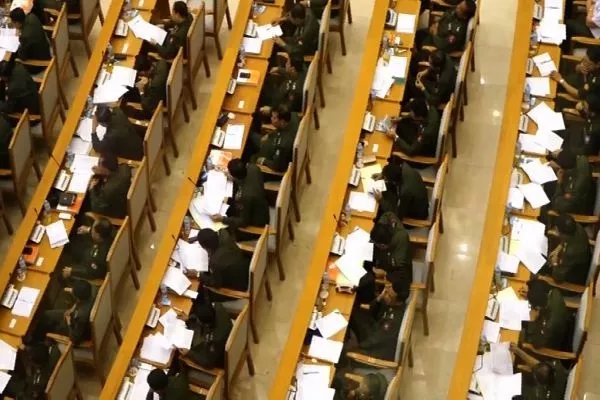An amendment bill, distributed to MPs in the Union Parliament on Wednesday, suggests easing constitutional articles 59 and 436(a) but not to the degree that reform campaigners have advocated.
Drafted by the Joint Bill Committee, the proposal recommends a change to controversial Article 436(a): that the percentage of MPs required to approve the amendment of certain articles in the constitution be lowered from its current requirement of 75 percent to at least 70 percent.
Article 436(a) is the main clause under the section ‘Amendments to the Constitution’. It dictates that not only must three-quarters of MPs in both houses of parliament approve an amendment but that any proposed change also be put to a national referendum.
Under Article 436(b), other chapters would still require the approval of 75 percent of all MPs, but would not require public consent.
Many legal experts consider changing Article 436 as the gateway to constitutional reform in Burma. Observers point out that as 25 percent of all parliamentary seats are reserved for military appointees, the armed forces effectively controls veto power over any changes to the charter.
Amending 436 has been the focus of a nationwide campaign over the past two years by the main opposition party, Aung San Suu Kyi’s National League for Democracy (NLD).
The opposition party has also been at the forefront of voices seeking to overturn the terms of Article 59, which lay out the qualifications of anyone seeking the presidency or vice-presidency. Many critics say this section was tailored specifically to exclude Suu Kyi from becoming president by virtue of the fact that members of her family have foreign citizenship.
On Wednesday, the Joint Bill Committee recommended two alterations to that clause, though they were surely not what Suu Kyi – who is currently in China – had in mind.
Firstly, the committee suggested that Article 59(d) undergo a change in terminology – replacing the word “military” with “defence”.
The clause in question currently states that the president and vice-presidents must “be well acquainted with the affairs of the Union such as political, administrative, economic and military.”
Her opponents have previously maintained that Suu Kyi is unqualified to lead the country as she does not have military experience. Whether Wednesday’s proposed amendment to the wording does anything to alleviate those claims is dubious.
[related]
More significantly, the Joint Bill Committee’s recommended changes to Article 59(f) also fell short of the NLD’s expectations.
While the current clause prohibits anyone who has a parent, spouse or child with “allegiance to a foreign power” from seeking the presidency or vice-presidency, the committee proposed that this section be amended only to remove the word “spouse”.
The NLD chairperson would still in effect be barred from being president as she has two sons, Alexander and Kim, who both have British citizenship. Suu Kyi’s late husband, Michael Aris, was also British.
NLD spokesperson Nyan Win said the amendments suggested in the bill are superficial.
“The amendments suggested in the bill do not promise any substantial changes to the Constitution. It only lowers the percentage of MPs required to approve constitutional amendments from 75 percent to no less than 70 percent, but 70 percent still makes it implausible in practice to bring about charter amendment. In my opinion, this is unsatisfactory,” he told DVB on Thursday.
“Moreover, the bill only suggests removing the word ‘spouse’ from Article 59(f), not the presidential candidate’s legitimate children.”
The proposal submitted on Wednesday by the Joint Bill Committee also suggests abolishing constitutional articles 62, 63 and 64, which bar the president and two vice-presidents from being members of parliament or civil servants, or taking part in party activities during their terms of office.
It also recommended the annulment of Article 396(b), which concerns procedures for dismissing an MP.
Other recommendations included altering Article 261(a) from its proviso that the president hand-pick chief ministers of administrative regions to a system whereby MPs vote in the appointments.



